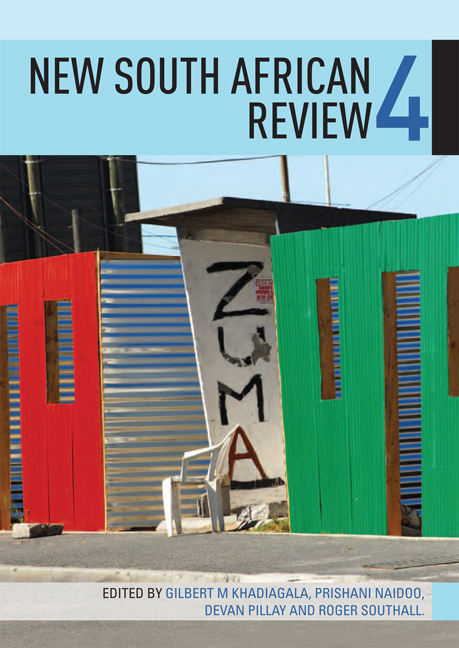Book contents
- Frontmatter
- Contents
- Preface
- Introduction: South Africa's fragile democracy: Twenty years on
- PART ONE ECOLOGY, ECONOMY AND LABOUR
- PART TWO POWER, POLITICS AND PARTICIPATION
- Introduction
- Chapter 6 Platinum, poverty and princes in post-apartheid South Africa: New laws, old repertoires
- Chapter 7 amaDiba moment: How civil courage confronted state and corporate collusion
- Chapter 8 Secrecy and power in South Africa
- Chapter 9 The contemporary relevance of Black Consciousness in South Africa
- Chapter 10 Death and the modern black lesbian
- PART THREE PUBLIC POLICY AND SOCIAL PRACTICE
- PART FOUR SOUTH AFRICA AT LARGE
- Contributors
- Index
Introduction
from PART TWO - POWER, POLITICS AND PARTICIPATION
Published online by Cambridge University Press: 21 April 2018
- Frontmatter
- Contents
- Preface
- Introduction: South Africa's fragile democracy: Twenty years on
- PART ONE ECOLOGY, ECONOMY AND LABOUR
- PART TWO POWER, POLITICS AND PARTICIPATION
- Introduction
- Chapter 6 Platinum, poverty and princes in post-apartheid South Africa: New laws, old repertoires
- Chapter 7 amaDiba moment: How civil courage confronted state and corporate collusion
- Chapter 8 Secrecy and power in South Africa
- Chapter 9 The contemporary relevance of Black Consciousness in South Africa
- Chapter 10 Death and the modern black lesbian
- PART THREE PUBLIC POLICY AND SOCIAL PRACTICE
- PART FOUR SOUTH AFRICA AT LARGE
- Contributors
- Index
Summary
The character of the struggle against apartheid was such that it produced (and was sustained by) a sense that every person could be a part of and could contribute to its shaping and success, and an imagination among ordinary people that their participation was not merely possible but even necessary in the making of a politics that placed power in their hands.
While the memory of leaders such as Biko, Mandela, Sobukwe and Tambo served to produce shared histories of (and inspiration for) struggle, it was in the everyday that the majority of South Africans felt apartheid and chose to fight against it. It was here that an imagination of the political developed (both at the level of the individual and the collective), an imagination that saw the active participation of ordinary people in decisions affecting their lives, both in the struggle against apartheid and for the time after its defeat.
In the first twenty years of electoral democracy in South Africa there have been several instances where elected leaders have pushed ahead with policies with which people have voiced their discontent. These past twenty years have also seen the greater institutionalisation of struggle, with party political formations, movements and organisations coming to dominate the political sphere, and policy formulation processes and negotiating forums determining the frame for participation. Nevertheless, when people have felt aggrieved (or felt the effects of policy changes) they have often come together in protest in the streets, re-asserting their power and refusing to have their voices excluded from political processes.
Although the recent death of Nelson Mandela has ignited a largely uncritical celebration of the idea and practice of reconciliation and the virtues of electoral democracy, the chapters in this section suggest that there is much in South Africa's history that reconciliation did not allow us properly to confront, much that continues to trouble those whose imagination of power, of politics and of their own participation in it was shaped in the years of the struggle against apartheid – years when Mandela and other leaders were distant figures whose remembered lives inspired extraordinary courage and resilience from ordinary people in their everyday lives.
- Type
- Chapter
- Information
- New South African Review , pp. 110 - 112Publisher: Wits University PressPrint publication year: 2014



